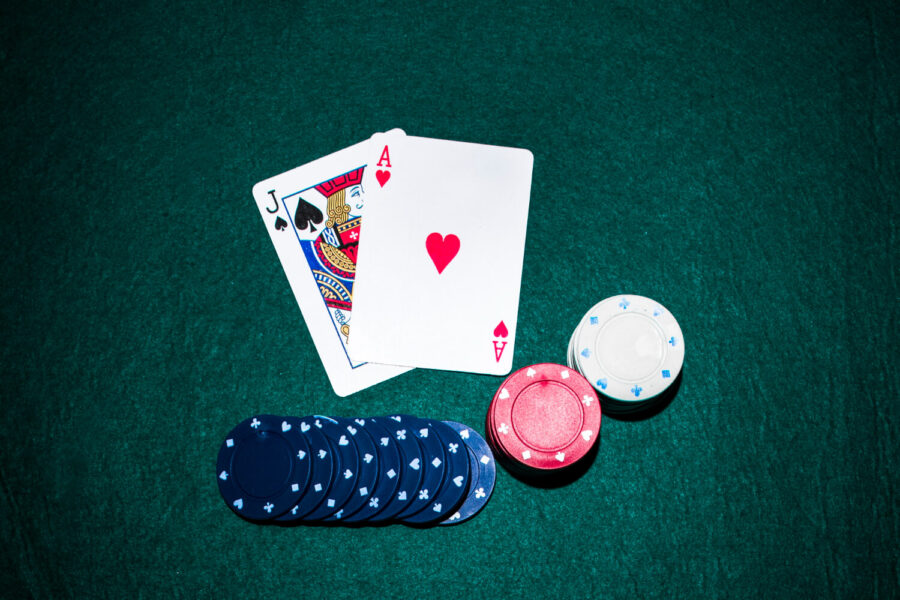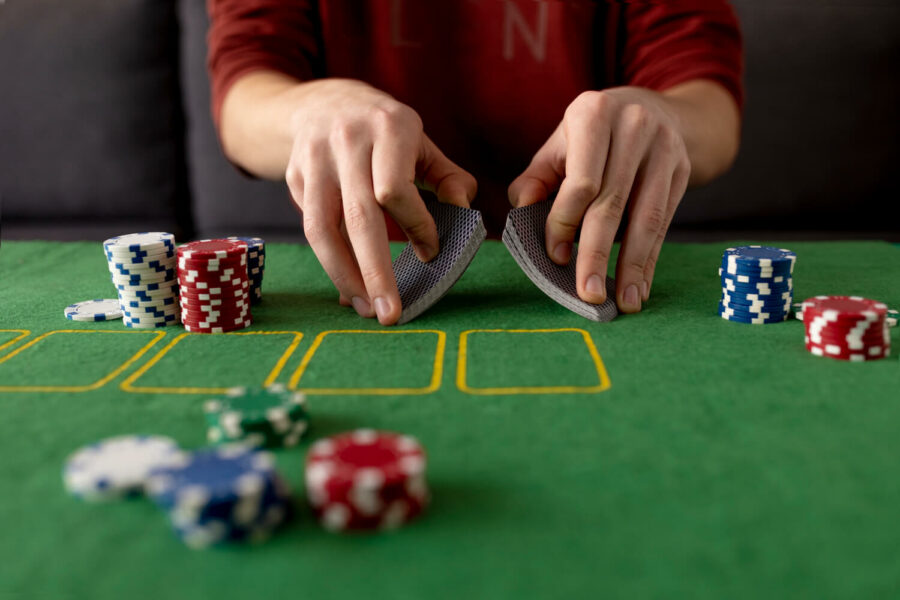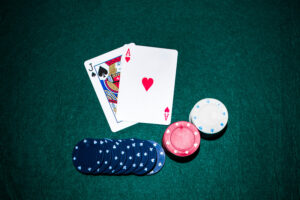When to Hit on Blackjack?

When you get to learn how blackjack works, it’s actually quite a simple game. But in the early stages, understanding what you can and can’t do is sometimes difficult. You’ll need to understand all kinds of terminology that you might not otherwise have thought of, such as hitting and standing.
Unlike insurance, which isn’t often taken in blackjack games, hitting is something that you’ll probably need to do in numerous games. Getting it right can increase your chances of winning, but making an incorrect move in this respect can have the opposite effect.
So, when should you hit on blackjack? What does hitting even mean? Keep reading, and we’ll reveal the answer to both of these questions.
What Does Hitting in Blackjack Mean?
When you choose to hit in blackjack, you will ask the dealer to give you an extra card. How you do this depends on where you play the game, but in many cases, you can show that you want to hit with a gesture. Alternatively, you can ask the dealer up front.
Hitting in blackjack is a popular strategy. Considering that you want to get as close to 21 as possible without busting, opting to hit can increase your chances of winning in situations where the cards you’ve been dealt don’t lead to a big enough number.
If you’ve read about insurance in blackjack, you’ll know that picking an insurance bet typically involves needing to stake 50% of your original stake. You’ll be pleased to hear that when you hit in blackjack, that is not the case. You don’t need to stake anything whatsoever, so you can experiment a little more freely with when you should and shouldn’t hit.
When Should You Hit?
Now that you know a little more about what hitting means in blackjack, you’re ready to begin learning when you should bring the practice to life. You can benefit from hitting in blackjack in a selection of scenarios, and we’ll cover these in the subsections below.
When Holding a Hand Lower Than 10
If you’ve followed along so far, you’ll know that we mentioned the requirements of what hitting involves. The dealer gives you another card, which you can add to your hand to increase the total of what you have. Since you need to get as close to 21 as possible, it often makes sense to hit when you have a low hand.
Whenever you receive a hand that’s lower than 10, you should strongly consider hitting in blackjack. That way, you can get yourself closer to your objective and give yourself a better chance of winning.
We’ll discuss how often you’re allowed to hit in more detail shortly, but you might want to consider doing so more than once if you have a particularly low hand. You can use your judgment for each game you play to determine whether doing so is a good idea or not.
When Holding a Hand of 12-16
While it often makes complete sense to hit when you have a low hand in blackjack, that’s not the only scenario in which you should consider doing so. If you have a hand that you could define as mid-range, it’s also a good idea to consider hitting.
Around the 12 mark is a bit of an irritating hand to have. While it’s better than when you have something lower, you’re still – in most cases – too far away from something that you can class as a winning combination. In these instances, you’re better off hitting; your chances of busting aren’t as high as when you’re higher up, though the risk does still exist.
When you have a hand of around 16, you’ll need to use your judgment more wisely. Hitting can, if you do it right, result in your chances of winning increasing significantly. However, you also have to consider the possibility of going over 21 – and therefore busting – which is quite high.
See also: How to Win in Blackjack?
When to Stand in Blackjack ?
In addition to hitting, you’ll also need to learn when you should stand in blackjack. But what does it mean to stand?
In simple terms, standing means that you keep your current set of cards. Should you choose to stand, the next person will take their turn.
Hitting is a useful strategy to have in your blackjack arsenal, but there are situations where you should avoid doing so. In the subsection below, we’ll discuss the main occasion in which you should think about standing instead.
When You’ve Got a Higher Hand
If you have a hand higher than 16, you should think carefully about whether hitting is a good idea. In most cases, you’re much better off standing.
Remember what we said about busting? Well, your chances of doing so increase significantly when your hand is higher. While you might pull off a masterstroke and reach 21 by hitting, your chances of doing so are quite unlikely. As a result, it is – in most cases – not worth doing so.
Of course, you should still use your judgment and analyze the patterns of your current game. In some instances, it might make sense to hit with a high hand. However, those scenarios are likely to be few and far between.
Blackjack Hit on 16
We’ve already discussed hitting in blackjack and when you should do it, and you now know that you probably shouldn’t use this tactic when you have a higher hand. But while standing might make sense for 17 and above in nearly all cases, 16 is a little more ambiguous. You still, of course, have a reasonable chance of getting five or lower when the dealer gives you your next card.
When thinking about a blackjack hit on 16, you’ll need to take things on a game-by-game basis. In some cases, it might make complete sense to take the risk and ask for another card. However, on other occasions, doing so might lead to an unnecessary bust.
If you’re new to blackjack, it’s worth standing until you know what you’re doing. Once you become more experienced and you’ve gotten to grips with the typical flow of blackjack games, you can begin to take more risks than would previously have been the case.
See also: How to Win More Often at the Craps Table
Can the Dealer Hit in Blackjack?
When playing blackjack, knowing what you’re allowed to do is only one part of the picture. You also need to consider what the dealer can and cannot do. Since we’ve discussed hitting and standing in this guide, you’ll probably be curious to know whether the dealer is allowed to hit in blackjack.
In simple terms, the dealer is allowed to hit in blackjack. Generally speaking, you can – unless everyone around the table is bust – expect the dealer to hit until their hand totals 17 or higher.
You’ll need to check out the rules for each different game of blackjack that you play, as they aren’t always the same.

How Many Times Can You Hit in Blackjack?
When opting to hit in blackjack, you can do so as many times as you want. So, if you have a particularly low hand, you might want to hit two, three, or even more times in a row. You won’t be penalized for hitting more frequently, but you should remember that your hand total cannot go beyond 21, or you’ll bust.
Generally speaking, you shouldn’t need to hit more than a few times in a row – unless you get incredibly unlucky with your hand. You should also think about the different rules for other variations of blackjack that you play, but for the most part, you’ll be able to hit numerous times.
Where Can I Practice Hitting?
Before you play blackjack at a real-life casino, it’s worth spending a bit of time practicing when it’s a good idea to hit during the game. You can always purchase a blackjack set and play with someone else, but not put money on the line. That way, you can experiment a little more than would otherwise be the case.
You can also try and find online games that are free to play, which will allow you to become more comfortable with hitting and standing in blackjack.
Can You Hit in Online Game?
Many variations of online blackjack follow the same rules as you’ll find if you played the game in a land-based casino. With that in mind, you shouldn’t have too many problems with hitting in online blackjack.
Everything You Need to Know About When to Hit on Game
So, there you have it – having read this article, you should have the information you need for knowing when to hit in blackjack. It might seem a little confusing at first, but doing so is actually very simple. You can hit as many times as you want in a blackjack session; the only big rule is that you don’t bust.
It’s worth keeping in mind that the dealer is, in most cases, obliged to hit until their hand is 17 or higher. Choosing the correct judgment will help you determine when is a good time to hit in blackjack, and when you should think about standing instead.











